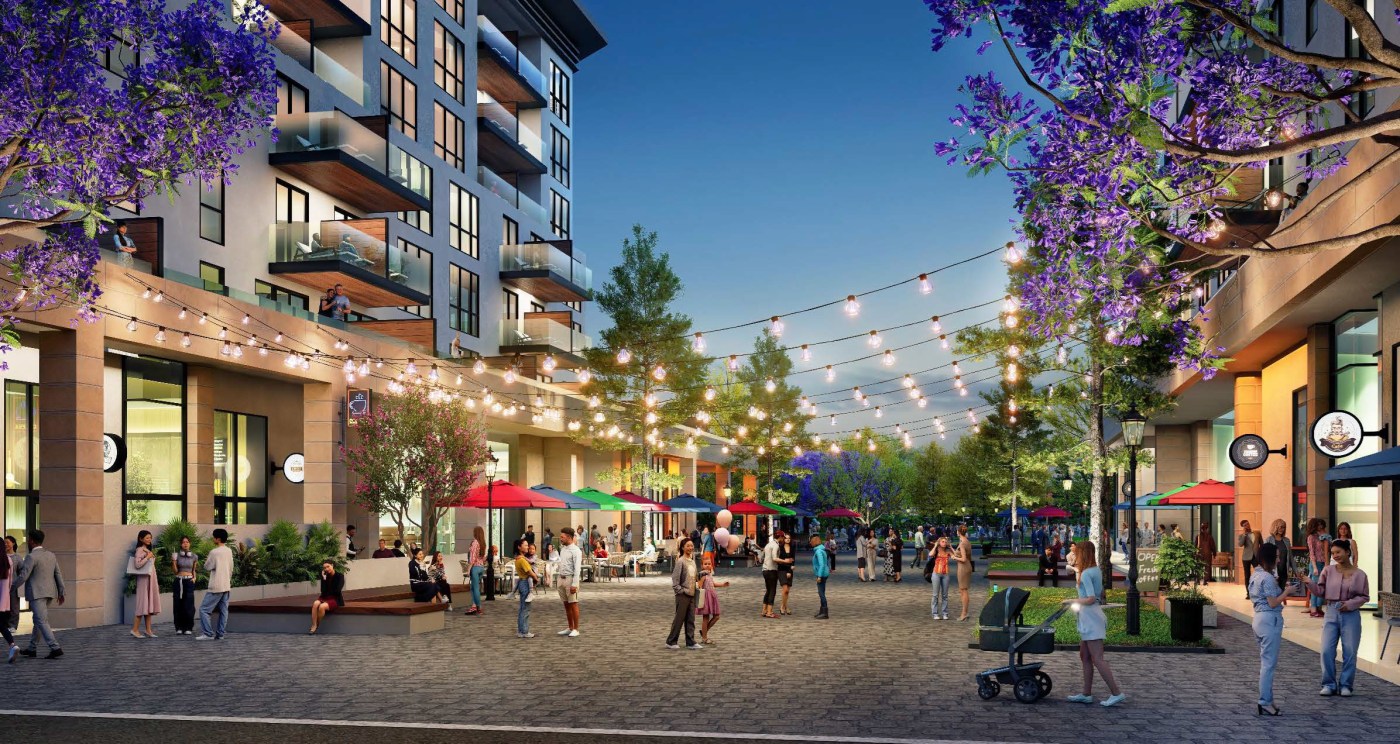Developers of the Pleasant Hills Golf Course have unveiled their latest plans for the massive swath of land that they say balances San Jose’s need for housing while incorporating community input and limiting impacts on the existing neighborhood.
Related Articles
Gov. Newsom, Legislature tangle with construction unions over minimum wage
Apple property shopping spree tops half-billion dollars in South Bay — this week
Costco buys office and research building near San Jose warehouse store
East Bay retail mall lands buyer in $80 million-plus property deal
Apple buys office hub in Cupertino in deal that tops $160 million
Lakeside Community, the development firm run by real estate veterans Tony Arreola and Mark Lazzarini, has planned for 2,000 homes — comprising a mix of single-family and mixed-use properties — for Pleasant Hills. The 113.5-acre site — bounded by Tully and White Roads across from Lake Cunningham Park — could be an integral piece in helping San Jose meet its ambitious housing goals.
Unlike the standard development process, this project took an innovative approach to engage residents by collecting feedback from the community through public workshops and meetings on the types of uses they would like to see before the city adopted a set of “guiding principles” in October, which the project would need to follow.
“We have proposed a high-quality development that is responsive to the community’s vision for the site,” Arreola told The Mercury News. “Our unit mix transitions from the existing single-family neighborhood to offer a wide variety of opportunities for first-time homebuyers while also offering much-needed affordable multi-family and senior housing. The key now is to advance the project through the permitting process so it can deliver the housing San Jose so desperately needs.”
The fate of the now-defunct golf course has been a source of consternation for residents in East San Jose, as the site was never envisioned for significant residential development, raising questions about how such an ambitious project could impact the surrounding single-family neighborhoods.
Opened in 1960, Pleasant Hills has sat vacant since 2004, except for intermittent grazing on the property.
During the engagement process, community members requested a mix of densities and housing types while limiting building heights due to the current character of their neighborhood. An initial proposal had called for 1,716 units, prompting housing advocates to say the city would miss a great opportunity to fill the housing gap by not requiring higher densities on such a large piece of land.
District 8 City Councilmember Domingo Candelas, who represents the area, emphasized that community input remains crucial and that the project must reflect both the community’s voices and city policy.
“We’re still in the early stages of the Pleasant Hills Golf Course development process, and there is much work ahead before a final project is brought to the Council,” Candelas said. “From the outset, I have been clear about the community’s guiding principles being the foundation of any future development to accurately reflect the needs of the surrounding community.”
Although the property is not part of San Jose’s housing element, which runs until 2031, the city as a whole needs to plan for 62,200 units to meet demand.
However, San Jose has struggled to keep pace, with the city failing to see a single construction start last year for market-rate multi-family developments over 20 units, making the Pleasant Hills project a potential bonus should it be constructed.
Recognizing the need for more density, Lakeside Community’s latest proposal increased the units per acre count to 32. It includes small lot single-family homes with alley-loaded garages and shared courtyards, two- and three-story townhomes, and three-story townhomes stacked above first-floor flats. The developers also have planned a mixed-use area at the southwest corner of the site, which will include a variety of affordable senior and multi-family apartments, along with workforce and market-rate apartments, all situated atop neighborhood-serving retail space.
Land-use experts warned that pushing the density levels too high would not only aggravate the surrounding neighborhoods but also potentially impact the project’s ability to be built.
“A project of this size has multiple complexities, but the largest one is the ability to finance it,” land-use consultant Bob Staedler said. “The product mix, like the one proposed, makes it feasible to finance and execute the project. That’s one of the major points that gets lost when you talk about delivering housing units.”
A rendering depicts Lakeside Community’s vision to add a natural park space to the proposed development at the former Pleasant Hills Golf Course. (Courtesy of Lakeside Community)
Aside from the housing components, the development has envisioned a community center, a central square with cafes, restaurants and ground-floor retail, and naturally landscaped park spaces to promote biodiversity and public health. Pathways will connect the amenities and also link them to light rail services and Lake Cunningham Park. The community could also have a central park with a stage for performances and a lawn area for seating.
“Residents spoke up for quality parks, safe streets and a variety of homeownership opportunities for our workforce and their families,” Lazzarini said. “We have tried our best to honor the time, energy and public resources invested by bringing to life an inclusive vision for the site, working together with community stakeholders to deliver new housing opportunities.”
While the project is still by no means a slam dunk, it has received generally positive reviews from some nearby neighborhood leaders who have been involved in the community engagement process from the beginning.
“From what I saw there and what I’ve heard, they have been trying to incorporate input from the community and create interesting spaces for civic engagement,” said District 8 Community Roundtable President Pat Waite. “They’ve been very cognizant of the community’s desires and not to be an unpleasant thing plunked down on the corner … I think they are moving in the right direction.”
Some neighborhood leaders, however, still have concerns.
Christina Bui, a longtime resident and president of the Tully Road-Eastridge Business Association, said she would like to see even more engagement, including with younger generations, and had asked for more community spaces that the existing neighborhood could access.
Michael Gabler, president of the Norwood Neighborhood Association, stated that one of his primary concerns was the limited number of entry and exit points proposed for the new community, which could lead to traffic issues for residents.
While he was not happy with the bump in housing units, Gabler said he understood the need for compromise.
“If you ask most of the neighbors, they would be happy leaving it to the cows, but that’s not really a feasible solution,” Gabler said. “Then, you have a very small contingent saying we should be building thousands more homes, but that would lead to a whole host of problems.”





